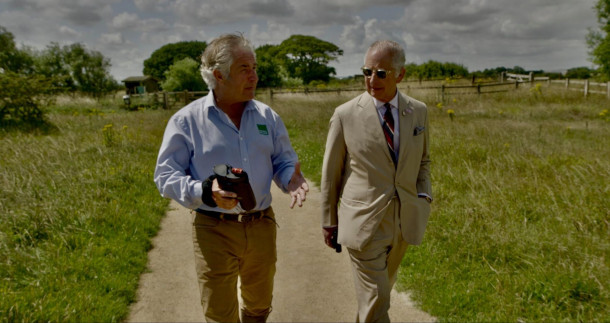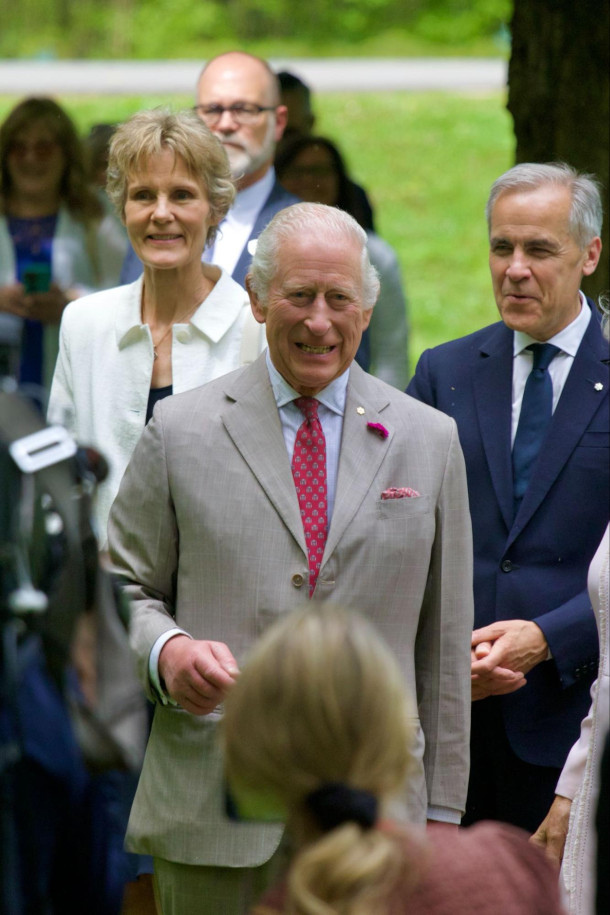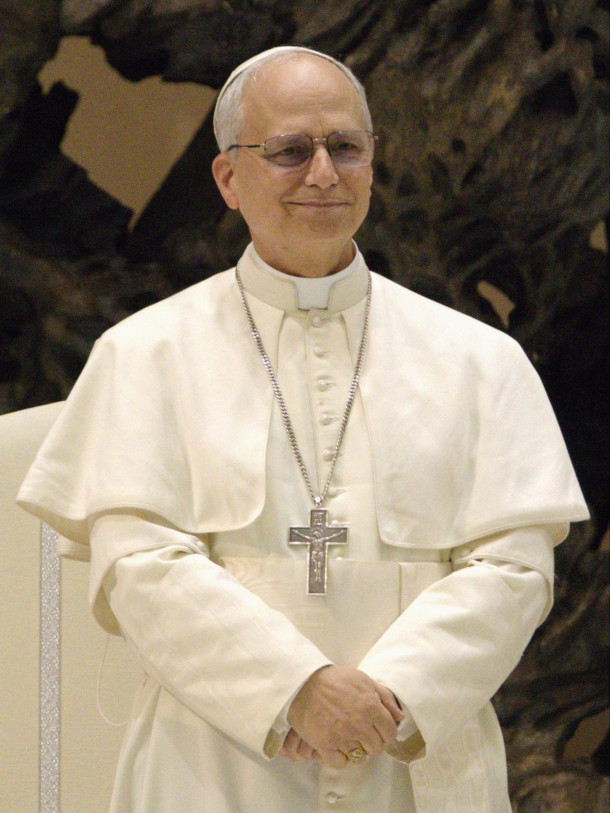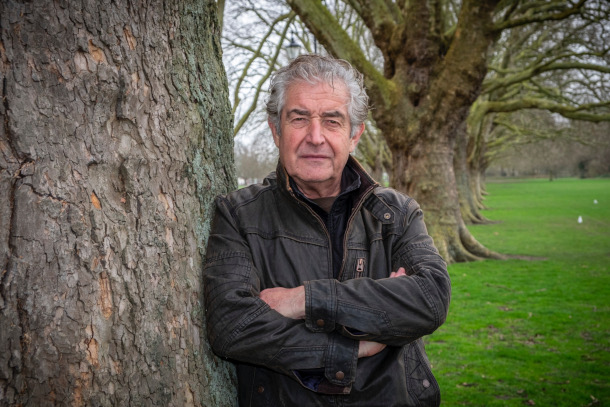Pope and King Share a Prayer for Creation
Air Date: Week of November 7, 2025

Tony Juniper spoke with King Charles III in July 2023 at a new nature reserve in a group of 25 reserves called “The King’s Series.” (Photo: Courtesy of Tony Juniper)
King Charles III, who leads the Anglican Church, and Pope Leo XIV, who leads the Roman Catholic Church, recently joined in a historic prayer in the Sistine Chapel. This act of unity by these two faith leaders who are also sovereign heads of state was embedded in their shared concern for the environment, or creation. Tony Juniper coauthored King Charles's book on the environment, Harmony and chairs Natural England, a government conservation agency. He speaks with Host Steve Curwood about how these leading Christians may make a difference for the planet.
Transcript
DOERING: It’s Living on Earth, I’m Jenni Doering.
CURWOOD: And I’m Steve Curwood.
[CHOIR SINGING]
CURWOD: The serene music of the choirs of Windsor Castle and Saint James chapel children, along with the choir of the Sistine Chapel floated up to the famous ceiling painted by Michelangelo during a most historic gathering this October. It was part of the very first public prayer bringing together King Charles III, supreme governor of the Anglican Church, and Pope Leo XIV, supreme pontiff of the Roman Catholic Church and it ended five centuries of separation. This act of unity by these two faith leaders who are also sovereign heads of state was embedded in their shared concern for the environment, or creation. Pope Leo offered a prayer:
POPE LEO: Let us pray. God our father you have created the heavens and the earth and made us in your own image. Teach us to see your hand in all your works and your likeness in all your children. Through Christ our Lord. Amen.
CURWOOD: Under the leadership of Pope Francis, Pope Leo's immediate predecessor, in 2015 the Catholic Church issued Laudato Si and later Laudate Deum, a pair of encyclicals that spiritually detailed the urgent need and morality of caring for creation. And When King Charles was the Prince of Wales, he wrote Harmony: A New Way of Looking at Our World. It was also a moral document steeped in spirituality with its detailed call for sustainability, action on climate change and the protection of nature.
This new unity of the Catholic and Anglican Churches brings together more than a billion people of faith under two leaders with deep understanding of our imperiled Earth.
For some insight as to how these leading Christians may make a difference for the planet, we turn now to Tony Juniper, who was a coauthor of King Charles's Harmony.
He's also a former head of Friends of the Earth UK, and now chairs Natural England, a government conservation agency. Welcome back to Living on Earth, Tony!
JUNIPER: Lovely to see you again, Steve, and nice to have a little chance to catch up.
CURWOOD: So recently, we had Pope Leo and King Charles III praying in the Sistine Chapel together. How big a deal was this, Tony?
JUNIPER: This is a hugely significant and historic moment, because this is the first time we've had such a coming together in prayer of the head of the Anglican Church and the leader of the Catholic Church since the Anglican Church was formed when Henry VIII broke away from the Roman church in 1533, and it was a time of really quite considerable upheaval across Europe in what has become known as the Reformation, with other religious movements breaking away from Rome. So this coming together of these two leaders at this point, it is very significant, because it's not happened before, and comes in the wake of some really very dramatic history.
CURWOOD: And according to the Vatican, during their meeting, Pope Leo and King Charles discussed some of their shared interests, including alleviating poverty and caring for the environment. How important were those subjects for this meeting?
JUNIPER: Well, I think very significant. I don't know what the details of the conversations or the prayer included, but evidently, this focus on ecological concerns and the protection of creation is a shared passion and really matter of spiritual identity for both of these leaders. And so that statement of common endeavor on these questions at this time, in particular, when we do have this retreat in some places, away from the ambition that we need to tackle this twin crisis of nature decline and climate change. That is very significant indeed.
CURWOOD: Tony, you've advised the King on the environment and climate for a long time as King, as Prince of Wales. Tell me, how has the king advocated for the earth over those years?
JUNIPER: Well, he has been a consistent, powerful, articulate champion of the natural world and people's place within it, and that needing to be a more harmonious relationship. He's been bringing this message to the world now since the early 1970s, so for more than five decades. And there are a variety of subjects that he's brought to our attention from the need to sustainable agriculture to the need to protect the tropical rainforests, to the challenges posed by climate change and all of these issues and many, many others, he has been a vocal champion of, but in relation to this meeting with the supreme leader of The Catholic Church, you know, you see a coming together, not only of those concerns which sometimes are expressed in scientific terms or which are about policy. This is a deeply spiritual matter for King Charles, and of course, is so also for the Pope.

King Charles III has been an environmental advocate for more than five decades. (Photo: Hayden Soloviev, Wikimedia Commons, CC BY 4.0)
CURWOOD: Pope Francis was, of course, known for his encyclicals Laudato Si, and then Laudate Deum, advocating "Care for Our Common Home," and we've seen Pope Leo attending a Climate Justice Conference. I mean, to what extent is Pope Leo following in the footsteps of Pope Francis? And to what extent might he be willing to go even further?
JUNIPER: He evidently is following in the path that Pope Francis so powerfully laid out. Whether he will go further, I don't know, but under the circumstances and the extent to which we are now in the face of a gathering emergency when it comes to climate change, it may well be that he does feel as though he needs to say more and to do more in painting a picture of a really urgent situation that now needs to be taken very much more seriously than is presently the case, certainly in some countries.
CURWOOD: So King Charles and Pope Leo are faith leaders. They're heads of state, but they're not politicians. What is the power, what is the value of them coming together on these concerns as faith leaders, beyond the immediate sphere of political action?
JUNIPER: Well, that's a really good question, Steve, and I think the power of this is absolutely enormous. And the reason I say that is because following many decades of reflection myself, I think it becomes clear that our failure thus far to deal with climate change and to deal with the extinction crises and the degradation of ecosystems, this is not something that we can put down to a lack of information or a lack of awareness. I think it is down to the extent to which these questions have been seen as scientific or technical issues, or issues that are dealt with in policy, when in fact, if you look at the roots of our difficulties at the moment in being able to rise to the challenges at hand, it's very much more about our worldview and the extent to which we have been progressively disconnected from nature and our collective philosophy has become separated from the functioning of our natural world, because that sacred nature of nature was very much there in the teachings of early Christianity, and in his book Harmony, which was published in 2010, the King speaks about the other religions, Hinduism, Taoism, Islam, and the extent to which all of these, in their early manifestations, had a very strong relationship with the sacred nature of creation, which was seen to be the work of God and thereby something which we should take care of. And so for these leaders to be thinking about the joint teachings of the Anglican Church and the Catholic Church in ways that brings creation and God's work back to center stage, I think is a really, really important part of how we begin on this journey towards a more sustainable and harmonious future.

Pope Leo XIV appears to be following in the footsteps of the late Pope Francis in his concern for the environment, our guest Tony Juniper says. The Pope recently attended the “Raising Hope for Climate Justice” Conference, where he reflected on the ten year anniversary of Pope Francis’ encyclical, Laudato Si’. (Photo: Edgar Beltrán, The Pillar , Wikimedia Commons, CC BY-SA 4.0)
CURWOOD: Here in the United States, Tony, there were many moves made on the policy level to deal with the racism here, but it was the Black church in the South that really led the movement that changed social attitudes as well as the law. This was not something which even a Supreme Court decision hadn't been able to settle in this country. So to what extent do you think having two of these most important leaders of major religions stepping out this way on the question of the environment and, as you say, care for creation, what chance does that have to make the kind of breakthrough that those Black preachers and then white preachers, by the way, were able to do on the matter of race in the United States?
JUNIPER: Well, I think that's a really good parallel, Steve in drawing the distinction between the law and policy on the one side and a social movement on the other, which brings about change from the bottom up through people shifting their attitudes and shifting their values. And if we are going to shift the world away from its self-centered, consumerist, self-destructive path that it's on at the moment, we're going to need to foster much more of a groundswell of change. And so for leaders who are beyond politics and who bring a spiritual dimension, and who are by definition, able to take the long view, because they have their roles for life, that's a very different offering to society. And it's very interesting that Pope Leo and I know King Charles see very strong relationships between these questions of social justice and environmental themes. And indeed, the encyclical that Pope Francis released before the Paris agreement negotiations in 2015 really brought these matters of justice and ecology very close together, and Pope Leo has reinforced that message since he has become Pope. And I know that King Charles very much thinks in these terms of these linkages between human well-being and the ecological challenges that are before us, and hopefully those messages being brought out by these two leaders at the tops of these two massive global religious movements, this can begin to filter down to inform and inspire the grassroots. In many ways, they've opened the door for what I hope is a reawakening of some of the implicit values in Christianity. The ecological side perhaps will begin to be given more weight as a result of this meeting, and linked to some of those more familiar struggles about fairness and justice that have been in the church in different ways for a very long time.

Tony Juniper is a former head of Friends of the Earth UK, has long advised King Charles III on the environment and climate, and now chairs Natural England, a government conservation agency. He’s also the co-author of King Charles’ 2010 book, Harmony: A New Way of Looking at Our World. (Photo: Jason Bye)
CURWOOD: So COP30 is underway now in Brazil. So what kind of impact do you think this recent display of unity from these two religious leaders will have on the talks there?
JUNIPER: It can only be positive at a time when the world is divided and there's very visible conflict and much discussion about the need for unity, these two leaders coming together on this subject at that moment is very important. And if you look back at the impact of Laudato Si and the Pope Francis encyclical that was published a couple of months before the negotiations in Paris that led to the Paris accord, one can only hope that there will be a signaling of the need for people to be working together coming from these faith leaders in a way which will have a visible impact on the negotiations. But of course, the world is in a very difficult place at the moment, with all sorts of discontinuities of consensus compared to where we were a decade ago. I do very much hope that what we will see in Brazil is a reaffirming of that consensus and world leaders departing there with every intention to redouble their efforts back home, but the momentum from the meeting of the Pope and King Charles taken forward to COP30 hopefully will see us in a space early in 2026 when we see the political ambition and the practical action really ramping up as a result.
CURWOOD: Tony Juniper is the Chair of Natural England, a government conservation agency, and was co-author with then the Prince of Wales in the book Harmony. Tony, thank you so much for taking the time with us today.
JUNIPER: An absolute pleasure, Steve, so nice to see you again.
CURWOOD: By the way, a documentary film titled Finding Harmony: A King’s Vision, about King Charles’ environmental legacy and spiritual philosophy, will be released in early 2026.
Links
Read the press release from the Vatican
Vatican News | “King’s Visit ‘Confirms Closeness Between Catholic and Anglican Churches’”
Vatican News | “Pope: God Will Ask Us if We Have Cared for Our Common Home’”
Listen to our conversation with Tony Juniper about King Charles III’s environmental legacy
Living on Earth wants to hear from you!
Living on Earth
62 Calef Highway, Suite 212
Lee, NH 03861
Telephone: 617-287-4121
E-mail: comments@loe.org
Newsletter [Click here]
Donate to Living on Earth!
Living on Earth is an independent media program and relies entirely on contributions from listeners and institutions supporting public service. Please donate now to preserve an independent environmental voice.
NewsletterLiving on Earth offers a weekly delivery of the show's rundown to your mailbox. Sign up for our newsletter today!
 Sailors For The Sea: Be the change you want to sea.
Sailors For The Sea: Be the change you want to sea.
 The Grantham Foundation for the Protection of the Environment: Committed to protecting and improving the health of the global environment.
The Grantham Foundation for the Protection of the Environment: Committed to protecting and improving the health of the global environment.
 Contribute to Living on Earth and receive, as our gift to you, an archival print of one of Mark Seth Lender's extraordinary wildlife photographs. Follow the link to see Mark's current collection of photographs.
Contribute to Living on Earth and receive, as our gift to you, an archival print of one of Mark Seth Lender's extraordinary wildlife photographs. Follow the link to see Mark's current collection of photographs.
 Buy a signed copy of Mark Seth Lender's book Smeagull the Seagull & support Living on Earth
Buy a signed copy of Mark Seth Lender's book Smeagull the Seagull & support Living on Earth

